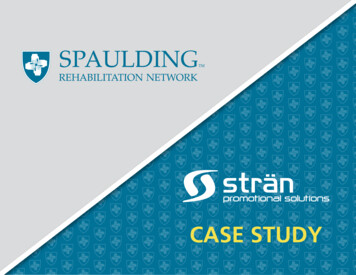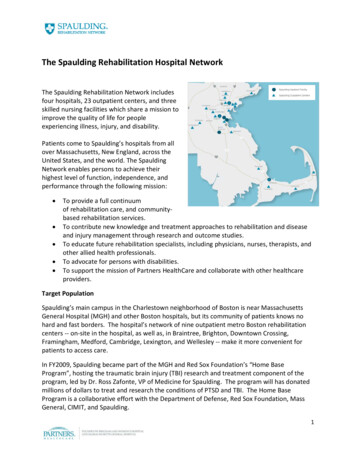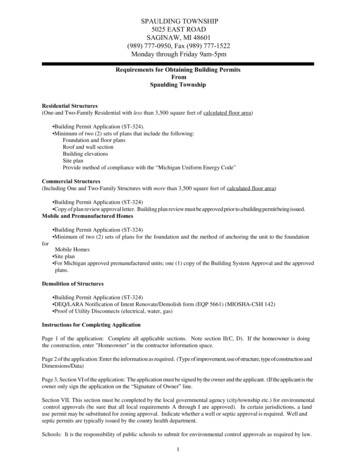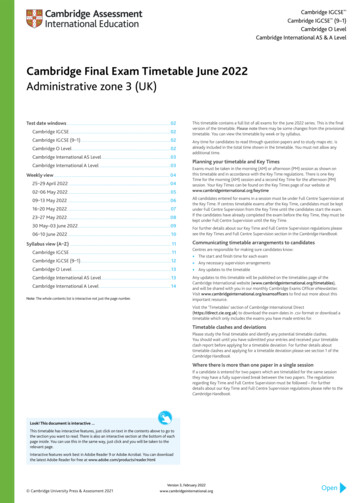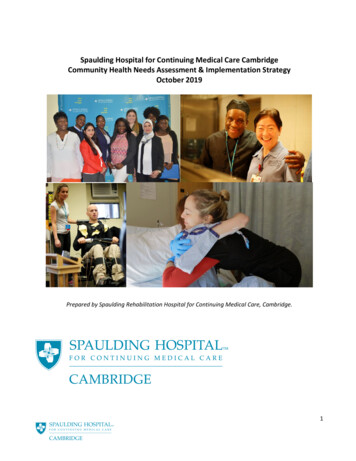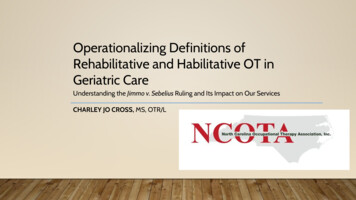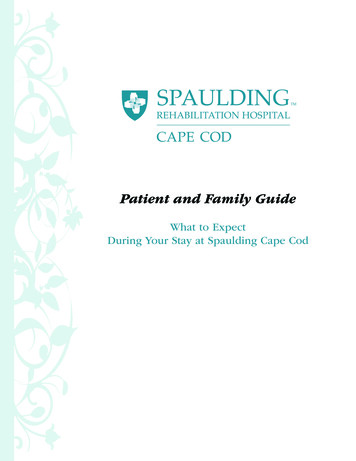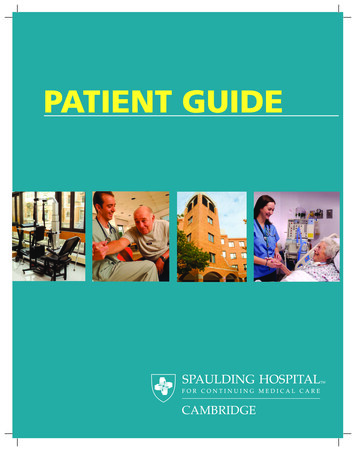
Transcription
1Welcome 2Your Rehabilitation TeamContentsPatient Services 3-4Guidelines for VisitingTelephonesTelevisionClothingBarber and Hairdresser ServicesPatient Meal ServiceCafeteriaATMComputer AccessSmokingElectrical AppliancesBelongings/ValuablesRoom/Bed ChangesDecisions ConcerningYour Health CareYour Right to Receive Informationand Make DecisionsAdvanced Care DocumentHealthCare ProxyOrgan and Tissue Donation55-7Preventing InfectionFall PreventionMedication SafetyEducation on Use of RestraintsEthics Advisory Committe2-3Physicians/Nurse Practitioners PhysiatristsNursesChaplainCase Managers and Clinical Social WorkersPhysical and Occupational TherapistsSpeech-Language PathologistsRespiratory TherapistsDietitiansOther Health Care ProfessionalsHospital GuidelinesPatient SafetyOn the Way Home7-99Discharge PlanningOutpatient ServicesHome CarePatient’s Rights and Responsibilities 10-13Care and TreatmentChoiceConsentInformationPrivacy and ConfidentialitySafetyPatient ResponsibilitiesNotice of NondiscriminationConfidentiality Policy13-15Conflict Resolution15Your Bill and Insurance Coverage15-16Your Medical RecordHow Do We Assure Your Privacy?Hospital ChargesIf You Have Medicare
WELCOME TO SPAULDINGWe are pleased that you have selectedSpaulding Hospital for ContinuingMedical Care Cambridge for your ongoingmedical and rehabilitation care. This bookletprovides you with information about yourhospital stay and treatment. During yourstay, you will have a team of health careprofessionals who are committed to makingthis a positive experience that meets yourgoals. We encourage you to be an activeparticipant in your care plan by letting usknow your needs and wishes and by askingus questions. We want your hospitalizationto be a satisfying experience for you. Ifthere are things that we are doing (or notdoing) that differ from your expectations, webelieve strongly that effective communicationis the best way for us to reach a mutuallyacceptable resolution. Please feel comfortableapproaching us to talk about ways that we maymake your hospitalization more satisfying.We can be contacted at the following addressand telephone number:Spaulding Hospital for ContinuingMedical Care Cambridge1575 Cambridge St.Cambridge, MA 02138(617) 876-4344Unit specific extensions:2 West ext. 79152 South ext. 34323 West ext. 34233 South ext. 34334 West ext. 34254 South ext. 34342YOUR TREATMENT TEAMWhen you are admitted, a Spauldingattending physician is assigned to your care.Physician/Nurse PractitionerYour attending physician/nurse practitioneris responsible for overseeing all aspects of caredelivered to you during your hospitalization.He or she will assess your clinical status,formulate your medical plan of care, monitoryour progress, and direct the activity of theentire healthcare team.PhysiatristPhysiatrists are physicians specializing inphysical medicine and rehabilitation who willassess and coordinate the rehabilitation plansof care for patients who are receiving activerehabilitation therapy.NursesMembers of your nursing team possessspecialized knowledge and clinical skillsthat they will use to help you regain youroptimal level of medical health and function.They recognize the profound impact thatyour illness or injury has upon your life, andwill work in partnership with you and yourfamily to maximize your health and wellness,prevent complications, and help you preparefor the transition to the next stage of yourcare. Each patient is assigned to a primarynurse upon admission. Your primary nursewill help develop a care plan that is unique toyou in order to ensure that your care needs aremet during your stay at Spaulding. He or shewill serve as a teacher as well as providingphysical care and comfort. Spaulding’s nursespractice based on professional standards,evidenced–based practice, and research.
3Case ManagementYour case manager will assist you inobtaining the services that you will need.He or she will assist you and your treatmentteam in establishing and adjusting goals. Heor she will speak with you about what yourinsurance will cover here, and will meet withyou regularly about your progress. Your casemanager will help plan your discharge bycoordinating your continued care at a level thatmeets your ongoing treatment needs, based onthe recommendations of the treatment team.Clinical Social WorkerSocial workers assist patients and theirfamilies in coping with the impact of illnessesand injuries and provide resource information.ChaplainThe hospital chaplain is available tocounsel individuals of all faiths. To contactthe chaplain, call 876-4344 ext. 5496, or aska member of your treatment team to call theChaplain’s Office.Respiratory TherapistsRespiratory therapists assist with evaluatingand treating conditions related to heart andlung function. They provide 24-hour coveragefor patients requiring respiratory care.DietitiansYour dietitian recommends therapeuticdiets, supplements, and special feedingprograms to ensure that you receive optimumnutritional care. Your dietitian also willeducate you and your family about guidelinesto follow at home.Other Health Care ProfessionalsDepending on your health care needs, otherprofessionals may join your rehabilitationteam.PATIENT SERVICESGuidelines for VisitingSuggested visiting hours are 11a.m. to8 p.m. Visitors may park in the SpauldingHospital for Continuing Medical CareCambridge parking lots as space permits freeof charge.Physical and Occupational TherapistsThe physical therapist evaluates and treatsproblems relating to mobility, strength,coordination, and endurance. The occupational Telephonetherapist helps improve your ability toTelephones are available at your bedside forperform everyday tasks, such as dressing,your personal use. The phone number is listedeating, personal hygiene, meal preparation,on the back of the phone.housekeeping, and community and prevocational skills.TelevisionSpeech-Language PathologistsOur TV service is a satellite-basedYour speech-language pathologist treatspackage. Television service can be activatedproblems that interfere with the ability toimmediately. Press the “on” button on yourspeak, swallow, understand, read, write, focus, television control.remember, or solve problems.
ClothingIf you have been admitted to SpauldingHospital for Continuing Medical CareCambridge for intensive medical care, wemay provide garments for you to wear duringtreatment. Once you are up out of bed andparticipating in an active rehabilitationprogram, you will probably be morecomfortable in your own clothing from home.Loose fitting, comfortable clothing, underwear,socks, and shoes that provide good supportare recommended. You may consider markingyour clothing and belongings with your name.Barber and Hairdresser ServicesHairdresser services are available atSpaulding. Arrangements can be made withthe staff on your floor.Patient Meal ServicesUpon your arrival, your Physician willprescribe a diet for you. You will meet aRegistered Dietitian who will discuss yourtherapeutic diet and follow you throughoutyour stay. Additionally, a team of Catering toYou Associates will work with you daily todeliver your menu and introduce you to theCatering-To-You meal service.Each unit has a specific Catering-To-YouAssociate and you can reach your CateringAssociate by calling from your room phone:2S x 39962W x 38743S x 38753W x 38844S x 39984W x 3884If you have concerns regarding the food,menu or service please contact our PatientServices Manager (x3997) orour Clinical Nutrition Manager (x3870).4Meal times vary by unit from:Breakfast 7:30AM – 8: 30 AMLunch: 11:30 AM - 12:30 PMDinner: 4:30-5:30 PM*Meal times will vary by unitAlternative meal times are planned based onyour treatment schedule.We will make every effort to make your mealshere at Spaulding enjoyable!CafeteriaCafeteria Hours are:Breakfast: 6:30 am - 10:30 amLunch: 11:30 am - 2:00 pmDinner: 4:30 pm - 6:30 pmVending machines located outside the cafeteriaare open 24 hours a day.ATMAn ATM is conveniently located in the mainlobby.Computer AccessSpaulding provides free of charge,wireless internet access to patients, familiesand visitors, for use on their personallyowned computers. Our information servicesdepartment can help get you started. Publiccomputers are available in the sittingareas near each nurses station. Security ofpersonal computing equipment is the owner’sresponsibility as confirmed in the hospital’sBelongings/Valuables policy.
HOSPITAL GUIDELINESSmokingSpaulding is a smoke-free hospital.Electrical AppliancesOur Engineering Department must evaluateall electrical and battery-operated appliancesfor safety. Your primary nurse can arrange thisfor you.Belongings/ValuablesThe Hospital cannot assume responsibilityfor money, jewelry, or other personalbelongings, unless they are deposited in thesecurity department safe. Your primary nursecan help you make these arrangements.If you have removable dental appliances,hearing aides, glasses, or similar items, youand your primary nurse should discuss thesafest storage for them when not in use.Room/Bed ChangesSituations may arise that require you to bemoved to another room. This may happen forreasons of medical necessity for you or yourroommate, or a need within the hospital tosafely accommodate all patients. When thesesituations occur, your primary nurse or nursemanager will speak to you and coordinate aroom change with the Admitting office.DECISIONS CONCERNING YOURHEALTH CAREThis section describes your rights as apatient under Massachusetts law to makedecisions about your health care, to accept orrefuse medical or surgical treatment, and tocomplete a Heath Care Proxy. It is importantthat you talk with your doctor(s), nurse, andother members of your health care team so thatyou know what treatments and procedures are5being considered so you can make informedand voluntary decisions.Your Right to Receive Information and MakeDecisionsWho decides about my health care?If you are an adult over 18 years of age andare competent, you have the right to makedecisions about your health care. You have theright to be informed about your treatment ina way that you can understand and the rightto consent to or not consent to any course oftreatment or therapy, including treatments thatare life saving or sustaining.Why am I being informed of my rights again atthis hospital if I have previously been informedand expressed my wishes?Your opinion as to your health and generalwell being may have changed recently ormay be subject to change during your stay atSpaulding. It is important that your doctors atSpaulding know what your wishes are at thistime. You may change your instructions toyour doctor(s) at any time.What if I am under 18 years of age?If you are under age 18 (a minor), yourparent or legal guardian usually makesdecisions about your health care. Some minorsmay legally make their own health caredecisions. Ask your doctor if you are able tomake your own decisions.What medical information should I receive tohelp me decide on treatments?You should know the possible risks,expected benefits, and likely outcomes forall recommended treatments and procedures,including the option of no treatment, beforeyou decide to accept the treatment. You andyour family should receive all information thatwould be important in making your decision.
Advance Care Documents and Health CareProxyWhat is an Advance Directive?An Advance Directive is a document inwhich you may express your wishes regardingfuture treatment if, through illness or injury,there came a time you were not able to makeor communicate your own decisions. Uponadmission, the hospital will ask if you havean Advance Directive. If you have completedone, you should provide the hospital with acopy of the document.There are different types of AdvanceDirectives. They include the Health CareProxy, MOLST and the Living Will, which aredescribed below. If you would like additionalinformation, you should speak with anymember of your health care team.What is a Health Care Proxy and how does ithelp me?A Health Care Proxy is the legallyrecognized Advance Directive inMassachusetts. The Health Care Proxyis a simple form that allows you to namesomeone (called your Health Care Agent) tomake decisions for you if for any reason youbecome unable to make or communicate thesedecisions yourself. The purpose of the Proxy isto ensure your wishes are respected if you areunable to decide for yourself.What is a Living Will?A Living Will is a type of AdvanceDirective in which you express your choicesregarding future treatment. A Living Willis not legally recognized in Massachusetts.Although providing evidence of your wishes,a Living Will may not necessarily give yourHealth Care Agent sufficient authority tocarry out your wishes in the same way asa Health Care Proxy. The hospital’s HealthCare Proxy form includes a section where you6may provide instructions for your agent orspecifically limit his or her authority.What is a MOLST?MOLST is a medical order form (similar toa prescription) that relays instructions betweenhealth professionals about a patient’s care.MOLST is based on an individual’s right toaccept or refuse medical treatment, includingtreatments that might extend life. Patient’swith serious advanced illness at any agemay discuss filling out a MOLST with theirclinician.If I want a Health Care Proxy, what should Ido?Case managers can assist you with a HealthCare Proxy, you can reach them at (617) 8764344 ext. 3568. Discuss your decision withyour family, your doctor, and the person youwish to name as your Agent.Do I have to complete a Health Care Proxy?Although it is recommended, you are notrequired to complete a Health Care Proxy.If you become unable to make your owndecisions and you have not named a HealthCare Proxy, your family may be asked topursue guardianship though the court system.What are some decisions about my medicalcare that I should discuss with my physician orsomeone else on my health care team?You should discuss all aspects of yourmedical care with your doctor. When preparingan Advance Directive, it is particularlyimportant to talk about treatment such as: Resuscitation (sometimes called CPR):treatment to restore breathing and heartbeat. Itmay include pressing on your chest, providingmedications through intravenous lines, orplacing a tube down your throat connected to abreathing machine.
7 Ventilator: a breathing machine (orrespirator) to breathe for you if you cannotbreathe on your own. Food and Fluids: food and water providedthrough tubes if you are unable to eat on yourown. Medications: drugs used to control pain,restlessness, infections, or other conditions. Comfort: care that helps make youcomfortable but is not intended to treatyour condition. Bathing, positioning, andmoistening your lips if they are dry areexamples of comfort care.All additional policies of this facilityregarding your rights to make health caredecisions are available from the CaseManagement Department.Organ and Tissue DonationIt is the policy of Spaulding Hospital forContinuing Medical Care Cambridge, incompliance with Massachusetts General Lawand Federal Social Security Regulations, tooffer patients and their families the opportunityto consider organ and tissue donation. TheNew England Organ Bank (NEOB) facilitatesthe donation process. If you have questions,you may discuss donation with your physicianor speak with a representative of the NursingManagement Department. The department willcontact the NEOB with your inquiries.PATIENT SAFETYSpaulding Hospital for Continuing MedicalCare Cambridge is committed to providing asafe environment and to continuously striveto improve the delivery of patient care. Inorder to provide the best possible experiencefor you as a patient, we want you to know thefollowing information.What is the most important thing that you cando to ensure your safety?The single most important way you canhelp to ensure your safety, is to be an activemember of your health care team. Be involvedin taking part in every decision about yourhealth care.Changes in Your Medical ConditionThe hospital has established a system forearly recognition and timely response tochanges in a patient’s condition. Our RapidResponse Team is comprised of physicians,nurses, and respiratory therapists who provideadditional clinical assistance to the patient,family, and attending nurse when needed.Patients and family members are encouragedto alert caregivers if the patient’s conditionis of concern or appears to have changed. Atsuch time, if your concerns have not beenadequately addressed, please ask your nurse orcaregiver about a further evaluation involvingour Rapid Response System.Preventing Infection Handwashing is one of the best ways toprevent infection. Wash your hands well withsoap and warm water for at least 15 secondsafter using the bathroom, before touching oreating food, or after touching contaminateditems or surfaces. Use the alcohol-based handsanitizer to clean your hands when you leaveyour room to prevent spreading infections toothers. Remind health care providers and visitorsto wash their hands or use the alcohol-basedsanitizer before they treat/touch you. Practice respiratory etiquette by coughingor sneezing into the crook of your arm. If youhave to use a tissue, wash your hands after use.If there is any Precaution sign posted, speak tothe nurse to learn why.
8 Tell your physician/nurse about allprescription drugs, over the counter drugs,vitamins, herbs, or dietary supplements youtake. Tell your physician/nurse about anyThe Spaulding Hospital for Continuingallergies or adverse reactions you have had toMedical Care Cambridge Infection Controlmedications.Nurse may be contacted at extension 3000. Ask for information about your medicinesHow can you and your family become a part of in terms you can understand--both whenyour medicines are prescribed and when youthe healthcare team? Speak up if you have questions/concerns. receive them: Make sure you get the results of all tests/ The name of the drug and how much totake?procedures. What the drug is used for and what it is When you are leaving the hospital, askyour doctor/nurse to explain the care you will supposed to do? When will it work and how will you knowneed at home. Ask a family member or friend to be there it is working? When and how to take the drug--withwith you, and to be your advocate. Learn about your condition and treatments food, special instructions? How to store it?by asking your doctor and nurse and using What to report to the doctor?reliable resources. If it can be taken with over the counterdrugs, vitamins, herbs, or dietary supplements.Fall PreventionIf you would like more information onthings like MRSA or VRE, we have thatavailable. Please ask your nurse.As part of the nursing assessment uponadmission, a falls risk assessment is completedfor all patients. Also, within twenty-four hoursof admission, all patients are screened byoccupational and physical therapists to assesstheir mobility and safety. Personal safetydevices and alarms may be implementedwithin the assessment period. Appropriatemobility devices will be provided to patientsas needed.The Fall Prevention Program includeskeeping your: Call light within your reach Personal belongings within your reach Bed in lowest positionMedication SafetyMake sure that all of your doctors knowabout everything you are taking.When the nurse is administering medicationto you, ask what is being administered andwhy.Patient/Family Education on Use ofRestraintsWe want you to know that we are a facilitycommitted to restraint reduction. We believein providing the highest quality care, therebyimproving our patients’ quality of life. We feelwe can best accomplish this by minimizingrestraint use. In this way, we hope to preserveour patients’ dignity while providing themwith a safe environment. The Federal andState Government, along with the JointCommission, also encourages a move toward arestraint free environment.By definition, a physical restraint is “anymanual method or physical or mechanical
9device, material, or equipment, attachedor adjacent to the patient’s body that theindividual cannot remove easily whichrestricts freedom of movements or normalaccess to one’s body.” Examples of restraintsinclude: Vest/chest restraint Arm, wrist, waist, leg, or ankle restraint Wheelchair seatbelt, lapboard or bar that isnot self-releasing Full length bedrails or geri chairsMany adverse effects have been associatedwith the use of these restraints includingmuscle and bone weakening that can leadto immobility, chronic constipation andincontinence, low self esteem, withdrawal,depression, loss of dignity, pressure ulcers,and death due to suffocation or strangulation.Because of these possible serious effects, weare asking for your support in our restraintreduction policy.We will strive to meet your health needs,make our environment safe and provideyou and your family with the necessaryinformation to promote your own safety.We ask that you take responsibility to useappropriate caution, report safety concernsto facility staff, and take part in planning foryourself or for your family member’s safety.We believe we can provide a higher qualityof care and improve quality of life by reducingrestraint use and that this can be done withoutcompromising safety. If safety becomes anissue in our facility, our clinical team will meetwith you or your family to develop a plan toprovide the safest environment possible.If you have questions about our restraintreduction policy, feel free to contact anymember of the clinical team.for consultation with patients, families, andstaff who face difficult treatment and caredecisions.The Committee is available for discussionand advice on ethical issues that may resultwhen a question and/or conflict arises becauseof individual values and personal judgments.ON THE WAY HOMEDischarge PlanningThroughout your stay, your case managerwill work with you to arrange post-dischargeservices. We recognize that our patients arefacing complex illnesses and will need furtheraccess to healthcare services after their stayat SHC. Our staff of case managers willwork with you to set up individualized careat the appropriate setting for your continuedrecovery and rehabilitation.Skilled Nursing FacilityMany patients need continued inpatientnursing care and therapy before they are ableto return home. Your case manager will createa list of facilities for you based upon yourindividual care needs and your geographicalpreference. Ask your case manager forinformation about the Partners Skilled Nursing(SNF) Collaborative.Outpatient ServicesYour physician may prescribe outpatientrehabilitation. Your case manager will assistwith this transition. Spaulding offers theseservices in over 20 locations.Family Team MeetingSome patients and families find it helpful tohave a Family Team Meeting during their stay.You can ask your case manager to schedulea meeting for your family to meet with yourEthics Advisory Committeehealthcare team. These meetings generallyThe Ethics Advisory Committee is available last one hour and give you an opportunity to
10appropriate medical treatment and careavailable without regard to your economicstatus or the source of payment.6. For victims of sexual assault, to beHome Careprovided emergency treatment and medicallyYour physician may determine that theappropriate course of treatment includes home and factually accurate information aboutemergency contraception.care. Home care can be provided through7. To make decisions about the plan of carePartners HealthCare at Home, which servesprior to and during the course of treatment andmore than 70 cities and towns in Eastern andto refuse treatment to the extent permitted bySoutheastern Massachusetts.law and SHC policy, and to be informed ofthe medical consequences of this action. ThisPATIENT’S BILL OF RIGHTSincludes resuscitative and limitation of lifeWe, your health care team, promise tosustaining treatment.preserve your individual rights listed here8. To include or exclude any or all familyand ask for your cooperation. We also askmembers from participating in your healthyou and your visitors to understand yourcare decisions.responsibilities as a patient of Spaulding9. To consult with specialists (in addition toHospital for Continuing Medical CareCambridge and to be considerate of the rights any already involved in your plan of care) atyour own request and expense.of others.10. To expect a reasonable responseto requests for appropriate and medicallyAs a patient at Spaulding Hospital forContinuing Medical Care Cambridge you shall indicated care ad services, withing the capacityof SHC.have these Rights:11. To expect that your pain and symptomswill be assessed and treated with the goalCare and Treatment1. To be involved in all aspects of your care of minimizing your experience of pain anddiscomfort, to the extent clinically possible.and treatment.Patients are encouraged to tell their caregivers2.To equitable, considerate, respectfulabout their pain and discomfort experiencescare that includes consideration of yourand their responses to treatment, to bestpsychosocial, spiritual, cultural and personalfacilitate their pain and symptom management.values and beliefs.12. For dying patients, to care which3. To know the identity and specialty ofindividuals involved in your care. To refuse to optimizes dignity through the treatmentbe observed, examined, or treated by students of symptoms (as desired by the patient orHealth Care Proxy), the acknowledgement ofor any other staff without jeopardizing yourpsychological and spiritual concerns of theaccess to medical care.patient and family.4. For patients suffering for any type13. To expect reasonable continuity of care,of cancer, and specifically breast cancer,and to be informed by physicians and otherto receive information on all alternativecaregivers of available and realistic patienttreatments which are medically viable.care options when hospital care is no longer5. To receive prompt, life-saving treatmentappropriate.without delay and to receive the mostdiscuss your discharge plan, your care needs,and to ask questions about your care.
1114. To participate or have your designatedrepresentative participate in the considerationof ethical issues which arise in your care.15. To exercise cultural and spiritual beliefsthat do not interfere with the well being ofothers.Choice1. To express choice regarding servicedelivery, composition of the service team andconcurrent services.2. To request that another physician treatyou in the event that you are not satisfied withthe medical treatment you are receiving from aparticular physician. However, the physicianyou select is free to accept, or not accept, thetransfer of your care to him/her and you musthave the benefit of complete information andexplanation concerning the risks, benefits andalternatives to transferring your care to anotherphysician.3. To transfer to another facility whenmedically appropriate or upon your request.However, the receiving facility must firstaccept the transfer, and you must also havethe benefit of complete information andexplanation concerning the risks, benefits, andalternatives to such transfer.4. To recieve visitors and to deny visitors.(Health Care Proxy) or to have a legallyappointed guardian make or communicatedecisions on your behalf.3. To refuse to serve as a research subject,and to refuse any care or examinationwhen the primary purpose is educational orinformational rather than therapeutic. A patientwho accepts participation has the right to havethe proposed studies fully explained prior toconsent. A patient who declines participationis nonetheless entitles to the most effectivecare atht SHC can provide.Information1. To obtain from physicians and otherdirect care givers, relevant and currentinformation that you can reasonably beexpected to understand. When it is notmedically possible to provide you with suchinformation, the information should be madeavailable to an appropriate person on yourbehalf.2. To obtain from a person designated bySHC, a copy of any rules and regulations ofSHC that apply to your conduct as a patient.3.To review and obtain, upon request, acopy of your medical record for a reasonablefee and within a reasonable time frame. Tohave such information explained or interpretedas necessary, except when restricted by law.Consent or RefusalTo request amendment to health information1. To receive an adequate explanation ofand obtain information on disclosures of youryour health problems, the proposed treatment, health information in accordance with law andand the risks and benefits of treatment, so that regulation.you may give voluntary and well informed4. To be informed of SHC policies andconsent. You also have the right to have yourpractices that relate to patient care, treatmentquestions answered and long term financialor responsibilities.implications of treatment choices explained, in5. To be informed of available resources forso far as they are known, except in emergency resolving disputes, grievances and conflicts,situations.such as the Director of Quality and Compliance.2. To designate an agent to make health6.To receive from a person designated bycare decisions for you in the event you can no SHC, upon request, any available informationlonger make or communicate such decisionsthat the facility has relative to financial
assistance, payments and free care.7. To receive upon request, a copy of anitemized bill or statement of charges submittedto a third party payor.8.To notification, upon request, of youreligibility for reimbursement by any thirdparty payor for the cost of your care.9. To obtain, upon request, an explanationas to the relationship, if any, between SHCand any other health care institution, facilityor educational institution as long as saidrelationship relates to care or treament.10.
Spaulding Hospital for Continuing Medical Care Cambridge 1575 Cambridge St. Cambridge, MA 02138 (617) 876-4344 Unit specific extensions: 2 West ext. 7915 2 South ext. 3432 3 West ext. 3423 3 South ext. 3433 4 West ext. 3425 4 South ext. 3434 YOUR TREATMENT TEAM When you are admitted, a Spaulding attending physician is assigned to your care.

